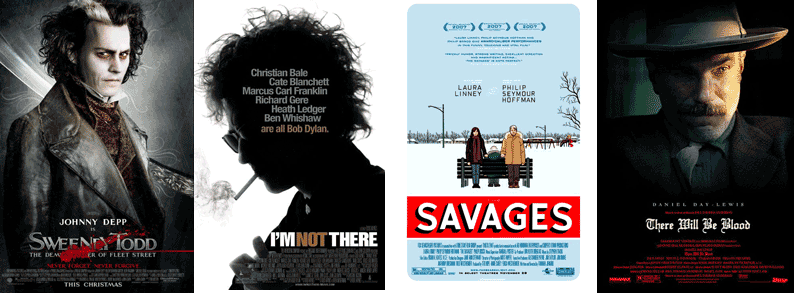“Before the Devil Knows You’re Dead”-This is the kind of film that often makes me wonder what the filmmakers were thinking when they decided to shoot it. It has a great director, Sidney Lumet, and stars the wonderful Philip Seymour Hoffman, but from the opening extended and graphic scene of Hoffman’s character, Andy Hanson, having rough intercourse with his wife, Gina (Marisa Tomei) in Rio, one gets the strange sensation that it’s headed in the wrong direction. And when we see the central event of the film moments later, only to be followed by multiple time transitions to events and conversations before and after the central event, things go from bad to worse. Andy Hanson is a man on a mission to make some money. He talks his weak brother, Hank (Ethan Hawke), into doing a robbery of a “mom and pop” jewelry store of which they have some knowledge. But weak Hank, without telling Andy, brings along an armed cohort, Bobby (Brian F. O’Byrne) to actually do the dirty deed and all goes downhill from there because the mom and pop store turns out to be owned by the Hansons’ parents, Nanette (Rosemary Harris) and Charles (Albert Finney), and Nanette, who wasn’t supposed to be in the store, also has a gun. One of the problems with this film is that none of the characters are particularly likeable and watching what happens to them brought, at least to me, a gigantic ho-hum if not a sense of disgust. The title is based on the saying: if you die, may you get to heaven a half hour “before the Devil knows you’re dead.” Well, in this film that would certainly be an appropriate saying for the fate of most of the characters. C+ (5/10/08) “Starting Out in the Evening”-Leonard Schiller (Frank Langella) is an elderly, mostly out-of-print, novelist living on the upper west side of Manhattan, attended to by his single daughter Ariel (Lili Taylor), just turning 40. While Ariel, an exercise instructor, is clearly uncertain about her love life and thinks about her former relationship with Casey (Adrian Lester), a relationship the ending of which her father disapproved, into Leonard’s life walks a mysterious and precocious redhead, Heather Wolfe (Lauren Ambrose), a graduate student doing her thesis on Leonard and his writing. Heather convinces Leonard to talk about the relationship between his life and his novels and, because Leonard resists, the two ultimately play a sensual cat and mouse game. In addition to the fact that I could make little or no sense of the title (does the “evening” refer to the fact that it is late in Schiller’s life?), the entire situation seems unlikely. Schiller is clearly a man who prefers to express himself by sitting at his old typewriter and putting his words on paper. He looks uptight and tired whenever he is being pressed by Heather. She, on the other hand, doesn’t seem to know when to stop asking questions and, aside from being attractive (well that could be important to an old man, although he certainly doesn’t show it for the first three quarters of the film), seems to bring little of importance to Schiller other than stirring up things he didn’t want stirred up. In the form of Ariel, Lili Taylor gives a very appealing and upbeat performance (maybe her most appealing), despite playing a character with some obvious neuroses. Adrian Lester also does a fine job as the man with set opinions about life who walks back into Ariel’s life. Frank Langella, a wonderful actor, is a little too taciturn to give the character of Schiller the obvious intellectual capacity that he deserves. Finally, Lauren Ambrose (“Six Feet Under”) is quite forceful and sexual as the mysterious Ms. Wolfe. “Starting Out in the Evening,” has a European art film feel to it. I’m not sure it succeeds, but it certainly presents an unusual and original exploration of characters quite different from the run-of-the-mill Hollywood film. B- (5/9/08) | |









